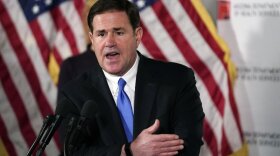The COVID-19 pandemic forced a lot of people to work from home and drastically change their driving habits. A new survey from Arizona State University shows many Americans expect those changes to last after the pandemic is over. KNAU’s Melissa Sevigny spoke with lead author Deborah Salon about the findings.
A big one is a lot of us are working from home right now, did you find that’s something that’s likely to continue?
I think a lot of people are looking at continuing to work from home… The way that we thought was the most informative was to look at the people who said they work from home at least a few times a week…. and we looked at how that changed from what they said they did before the pandemic and what they say the expect to be doing after the pandemic. That fraction of workers doubled. That’s a big change. It went from about 13% of workers before the pandemic to 26% after the pandemic.
Let’s talk about some of the other things you found. What else popped out at you about the results?
One other thing that jumped out at me was very closely related to the work from home stuff, that people were obviously going to be commuting less… That is indeed what we calculate from our data… We actually calculated how many miles the people in our survey would be commuting pre-pandemic and post-pandemic by car each day, and we found there was about a 15% drop in commuting vehicle miles travelled, or commuter miles travelled… Which is pretty significant. If you study transportation, people get very excited if you get a couple percentage points change in these kinds of numbers, so to see a 15% drop, it’s a big deal.
Do you have an idea of how long that might last? Is this a temporary jump, or…
I don’t know! We’re not sure. But the way we asked the questions on the survey was, we asked people what they expect to be doing once the COVID-19 virus is no longer a threat… Assuming people really do continue to work from home more often than they used to, that suggests they’re going to be driving less to the office and or to their workplaces than they used to. I think it’s probably real.
Did anything surprise you about the results?
There’s been a really—it seems like—a really large response of people saying, “I’m taking more walks, I’m enjoying taking more walks, I plan to walk more post-pandemic.” And we didn’t ask the question, walking as transportation necessarily; this could be taking walks in my neighborhood, walking my dog, all kinds of walking. But I think that this is important because this information about people wanting to walk more is coming at a time when we have a pedestrian safety crisis in this country as well…. If that’s really the continuing trend I think city planners need to be thinking especially carefully about pedestrian safety issues.
Do you feel like this survey showed a silver lining, are there things we can hold onto that will really make our communities better?
For sure. … People are really enjoying taking more walks…. spending less money, cooking more, spending more quality time with their families, so these kinds of things, a sort of slowing down feeling. A lot of people were saying those were the kinds of things they were really appreciating about this period, and they’re hoping to find a way to hold onto that as everything goes back to the way—well, hits a new normal, it’s not going to go back exactly to where it was—but goes back to more interaction.
Deborah Salon, thanks so much for speaking with me.
Yeah, thanks for talking to me.







